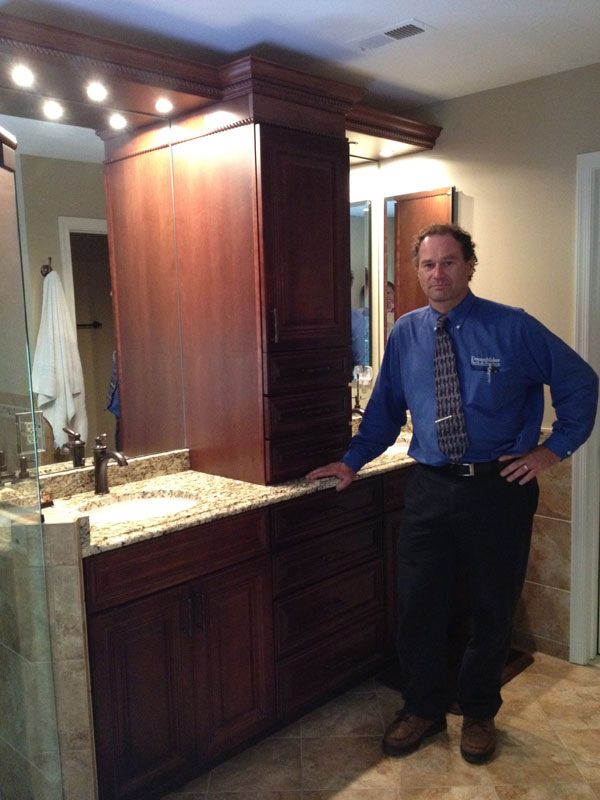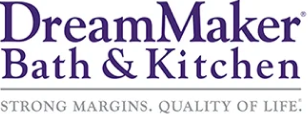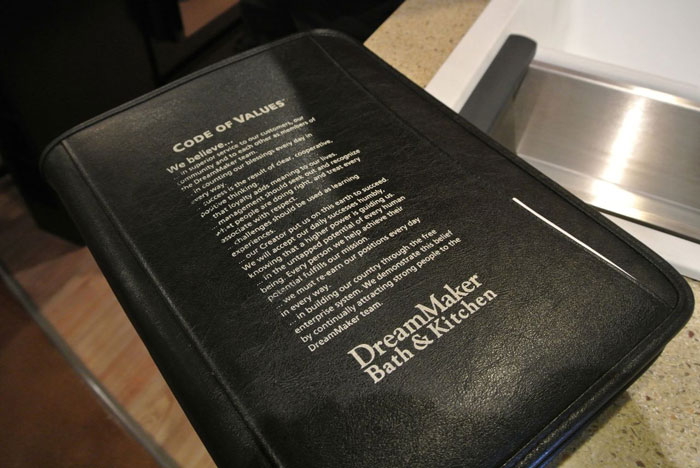Q&A with Steve Everett, owner of the DreamMaker remodeling franchise location in Fredericksburg, VA
 Steve Everett was on a never-ending treadmill with his remodeling business, working 80-hour weeks without any time for hobbies and precious little time for family. He also worried that decades of carpentry were taking a toll on him, and he wondered how much longer he could keep doing the physically demanding work. That’s why he is glad he found the DreamMaker remodeling franchise, which has helped him grow his business in Fredericksburg, VA, while working shorter hours.
Steve Everett was on a never-ending treadmill with his remodeling business, working 80-hour weeks without any time for hobbies and precious little time for family. He also worried that decades of carpentry were taking a toll on him, and he wondered how much longer he could keep doing the physically demanding work. That’s why he is glad he found the DreamMaker remodeling franchise, which has helped him grow his business in Fredericksburg, VA, while working shorter hours.
This is his story.
What were you doing before DreamMaker?
I have been a carpenter ever since I entered the workforce at 21. I started in 1983 as a carpenter helper, then became a carpenter, and eventually became the supervisor for a residential home builder in mid-1980s. I was eventually laid off during a restructuring of that company and started my own business doing trim work. I was really more of a handyman, but that evolved into a lot of remodeling work, and in 2001 I started my own remodeling business.
How did you find out about DreamMaker?
They called me in the summer of 2007, and we started to see if we were a good fit for each other. I’ve been with DreamMaker more than five years now. When they first called, I was evaluating my business model, and I had a desire to change the way I operated into a more structured business. At the time, I was operating it as a carpenter, not as a businessman. I would work on jobs every day, then go out and sell more jobs in the evenings. I worked LONG hours, doing jobsite work, sales work, office work, and I was getting really tired of it. I needed to change the way I did business, but I didn’t know how to do it. When DreamMaker started asking me questions and I researched them and called their franchise owners, I realized that this was what I was looking for.
How quickly did you notice the impact?
Well, you’ve got to understand that I am a carpenter, and that’s what my mentality has been for many years, so when I started with DreamMaker, I didn’t utilize the systems like I should have. I continued a pattern of working in the field more than I should have, and it inhibited my growth. Over the last couple of years, and especially in the last year, I have stopped working in the field and spend my time in the office running the company. Now I have my evenings for myself and my family. I don’t work weekends, and DreamMaker is really beginning to give me the quality of life that I envisioned. Having had the identity of being a carpenter for decades, it took me a while to adjust and have more of a business mentality. Now I view myself as a businessman, and it’s helped me run the company more efficiently and profitably.
What helped you make the transition?
Coaching helped change my mindset, as well as my Next Level accountability group, which allowed me to get to know more DreamMaker owners on a personal level and see how they run their business, and get their suggestions for changes I could make to mine. I knew I wasn’t doing things like I should, but I needed the kick in the pants. There are six franchisees in my group, and every six months we visit one franchisee and critique their business in great detail for 3½ days. Every visit I’ve done has provided a fresh perspective and new ideas for how to hit targets. After the visit, we have a monthly follow-up call to see what changes the franchisee has made and hold them accountable. You really don’t want to let your buddies down, so you work to take their suggestions and put them into action.
What is the culture like?
DreamMaker has the feel of a family. Every year DreamMaker has a convention, which they call the Reunion, and the fact that they call it that gives a real insight into the mentality of the corporate team, which welcomes you warmly. There’s always a lot to talk about, and everybody has a chance to bond and discuss common issues. DreamMaker owners get to know each other on a personal level at Reunions and training sessions, and when you continue to meet with six of those people twice a year, you develop very good friendships.
What sets DreamMaker apart?
DreamMaker makes an extra effort to reach out to customers on a personal level. We don’t just take orders for jobs, we ask detailed questions and get to know people so that we are able to truly enhance their lives with the work we do. That commitment to the person, not just the job, is really encapsulated in our Code of Values. I’ve heard several of my clients tell me that when they were looking for a contractor, they had guys come in, ask what they wanted and just take measurements. When I come in, I ask about them and their family, and they tell me that no one else has done that, and it made them take notice of me as someone who cares.
Another advantage is that DreamMaker, being a franchise, has a aura of size and legitimacy. We’re not just one standalone company in your community, we are part of a bigger network of companies that has preferred vendors and ongoing training. And of course, it’s great to be able to get advice from another owner. As an independent, if I had tried to call my competition down the street for advice, they would’ve looked at me like I was crazy.
How does DreamMaker help you stand out?
The marketing help is huge. Before DreamMaker, I did almost no marketing — it was mostly word-of-mouth referrals. DreamMaker offers a marketing system that covers the gamut of any kind of marketing you can think of — everything from yard signs to websites. They also teach you how to build recognition by using a thorough marketing plan, which keeps you at top of mind. If you are getting ready to remodel and you have driven by DreamMaker yard signs 10 times, seen an ad in the newspaper, seen a headline online, seen a Google search result, you are going to give us a try.
How do you develop your marketing plan?
Each franchise owner has a coach who helps with that, and you can also call people at corporate who can help you develop your marketing plan. And they give you ways to track your marketing to see what is working and what isn’t, and understand where your leads are coming from, so you can adjust and get the best return. It’s an ongoing process.
How important is previous remodeling experience?
I personally think it’s important to have some kind of experience in construction, but it really depends on who you surround yourself with in your company. If you are a very good businessman who has a competent person he trusts who knows remodeling, you could put him in a place of prominence in the company.
They really have a very well-rounded business model that covers every aspect of running a remodeling company. It sounds overly simplistic, but if you plug yourself into the system and run the system, it’s incredible. I think the mistake I made early on was trying to take the systems and add them to my company rather than using the systems to run my company. These systems are like a road map.
How has DreamMaker impacted your life?
I am more profitable — that’s the big one. Because I’m not working so much, I have a much better quality of life. And my name is also better known. People didn’t know my business before, but in the five years I’ve been with DreamMaker, people now recognize my business. That’s all part of the good branding. I also now have a couple of employees, and this business supports them and their families, too. I have a nice standalone office that I go to every day instead of a messy home office. And the DreamMaker mentality of serving the community has really made me feel like I’m having an impact. I wasn’t just put here to make money and retire some day. I was put here to make a difference in people’s lives, and DreamMaker helps me do it.
How do you feel like you improve lives?
We have a sector of the business that we call Independence by Design, which helps people with mobility issues. We will redo bathrooms or kitchens to help them live in their house rather than having to move to assisted living or something. It’s been said that the bathroom is the most dangerous room in your house, but it doesn’t have to be. We’re getting ready to build one for a 98-year-old lady who is recovering after she fell down the steps, and we are going to make her a nice walk-in shower where she can sit down and be comfy and not worry about falling and slipping. Helping people like that is the biggest thing.
You mentioned you’re able to work a lot less. How has your life changed?
Before, I would get up real early in the morning and start working around 6 a.m., go get materials for jobs, meet guys on jobsite at 7 a.m., work until 4, then grab a bite to eat at home and run back out to run a sales call. Then, I’d go back to work in my office until 9 or 10 p.m. Now, if there was something special going on with the kids, I wouldn’t work, but otherwise, I worked all the time — including Saturdays. I used to like to do woodworking and camping and bicycling and canoeing, but I was always consumed by work. I wasn’t making time for myself, which I needed.
Now that I have embraced the systems and am operating more efficiently, my hours are more 7-4 or 7-5. I do occasionally work a couple of hours in the evenings, but I went from 80 hours a week to probably 50-55 hours a week — and it’s not the hard physical work that I was doing before, it’s more thinking and sitting at my desk. I actually have the energy to do the things I enjoy doing when I get home. I used to be completely exhausted. That’s one of the reasons I was ready to buy a franchise. I was in my mid-40s, and being a carpenter for 25 years takes a toll on your body. I couldn’t see myself doing it when I was 55, 60, 65 years old. I needed to change what I was doing to something that would keep me in one piece! Also, I had tools and trucks, but no real business structure to sell. If I retired, I probably would sell everything and look to get $20,000 to $30,000 out of it. With DreamMaker, I have been able to build a good, solid company that is a tangible asset that someone will want to buy, or that I will be able to pass on to a family member or a loyal employee. There are systems and support that make it a good investment.
Now that you have more time for fun, what are you doing with it?
My wife, Pamela, and I have four kids and four grandchildren, and I have time to travel and take our camper nice places. We just discovered a nice beach called Sandbridge Beach (near Virginia Beach), and have plans to camp in the mountains. I’m also doing more gardening and have started to get into solar power. I like to tinker. I’m also planning to get into woodworking again. When my dad retired, he started doing woodworking and selling knick-knacks at craft fairs, and he made pretty good money at it. I have his original plans for toys and other things, and I look forward to making those things again. I also plan to start making furniture. It’s nice to have time to do those things again.
Would you recommend a DreamMaker franchise to someone else?
Yes, I would — but not to just anybody. If you like remodeling and have a real desire to make a difference, DreamMaker offers you a very good business structure that can help you make good money. But the most important thing is that it brings value to the community.



